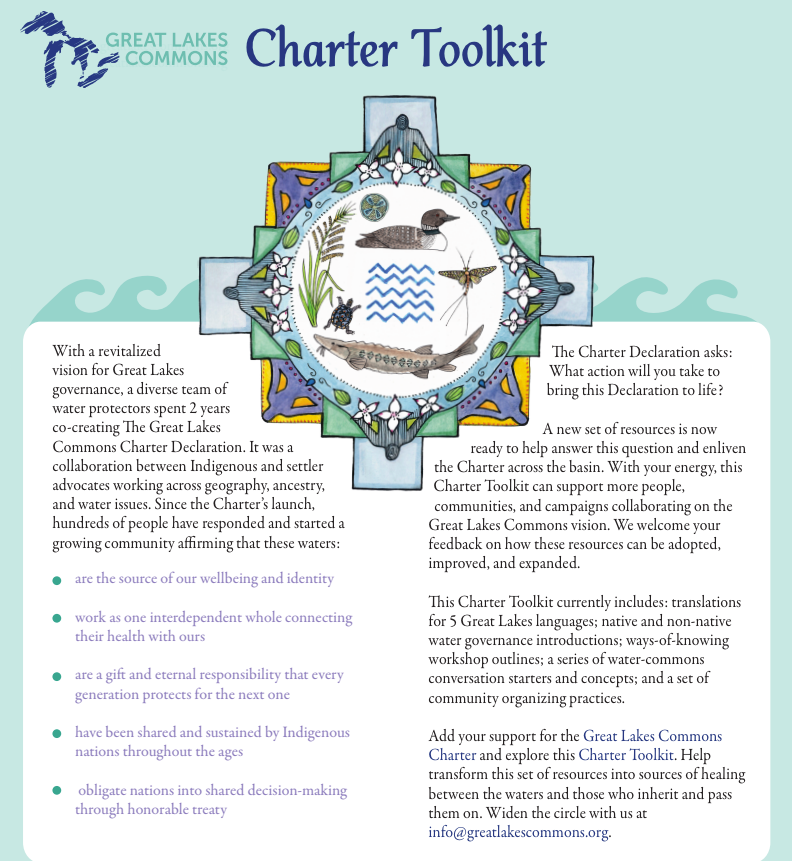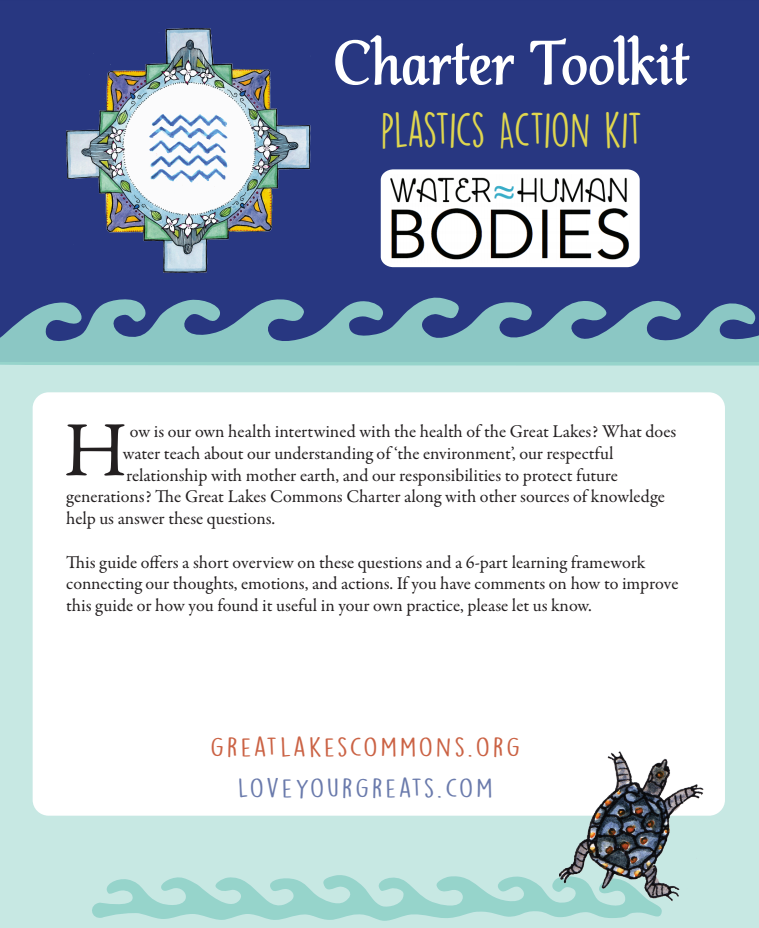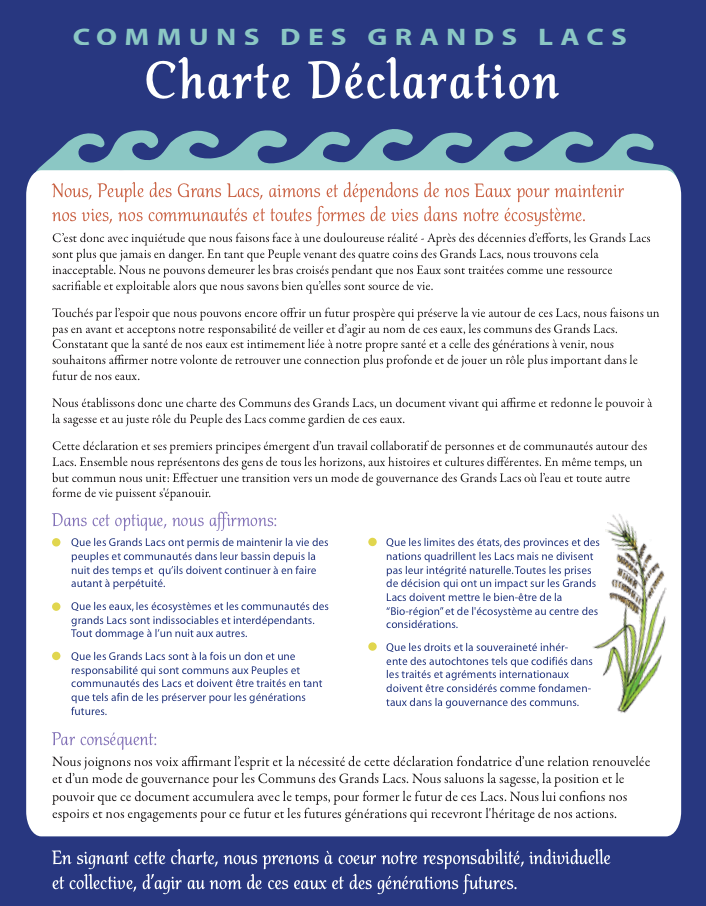Great Lakes Commons co-hosted a Water Summit in Flint this fall as part of a union of water organizations challenging Nestlé on its water bottling and calling an end the tap water crises in Flint, Detroit, and Indigenous nations. GLC hosted a workshop called "The Colonial Enclosure of Water" in the Great Lakes that showed several examples of how to re-centre Indigenous claims, perspectives, and rules for water governance.
Water Friendship for Everyone: seed project report
Protected solely as a resource, water is threatened most by our collective denial that water is much more -- it is also the source of many vital relationships.The Water Friendship project aims to name these relationships, present their value and role in water protection, and offer concrete actions to guide water policy, curriculum, and advocacy. Additionally, uncovering lost connections to water can connect people across different cultures, professions, and locations.
Dispatches from the Wastelands: touring folk opera talks to commoners
3 field dispatches from the 2016 folk opera tour "The Wastelands" performed by Children of the Wild. Here we visit Lorain (Ohio) Fon-du-Lac (Minnesota) and the Straits of Mackinac (Michigan) to hear the voices of poets, elders, and musicians calling out for a renewed relationship with the lands and waters. Includes 3 short videos.
Crashing Great Lakes Governance: making a safe bet on our water futures
The 2008 financial crisis was ripe for a meltdown since those most literate with the world’s financial laws and limits were accomplices in the damage. An obscure and unquestioned governance system was the ideal setting for public negligence and private greed. 2008 proved that banks are not “too big to fail.” The regulators and traders skirted responsibility and hit a windfall, while about 10 trillion dollars was taken from people’s financial assets. The system crashed, the banks failed their customers, and yet in 2017 it is still business as usual. In 2017 we should be wondering about the Great Lakes: will they crash as well?
Ben Weaver's Interviews: In Order To Be Clear Water Must Run
Water Friendship: finding a healthy relationship with water
What about the social bonds we have with water? Are we a good friend to water? Since we are in a relationship with water, what indicators do we have for measuring the quality of this relationship?
Whether we acknowledge it yet or not, we live in a world built on relationships. The environment is not a collection of resources. Environmental health is not a computation of biodiversity (the number of species) and elemental exchanges (water, air, soil, sunlight). What mainstream society has labelled ‘the environment’ is an illusion of separation. We are the environment.
Commons Currency: an econo-art project across the Great Lakes
While having money is private affair, the value of money is a commons. Like many other commons, money is a social agreement on what we value and how that value is exchanged and passed on. Let’s imagine for a moment.
Let’s imagine that the value of money is tied to the quality and availability of water to serve life in the Great Lakes basin. Since we are water, the water’s benefit is our benefit. We know economics is a sub-system of ecology and our money system needs to reflect this, not subvert it.
Spanish Commons Charter
Great Lakes Water Governance Primer
USE THIS ELEMENT OF OUR CHARTER TOOLKIT AND ADD YOUR NAME AND SUPPORT TO OUR TRANSFORMATIVE GOVERNANCE AGREEMENT -- THE GREAT LAKES COMMONS CHARTER DECLARATION.
We welcome your feedback on how these resources can be adopted, improved, and expanded.
Bottled Water: Starting A Commons Conversation
Use this element of our Charter Toolkit and add your name and support to our transformative governance agreement -- the Great Lakes Commons Charter Declaration.
We welcome your feedback on how these resources can be adopted, improved, and expanded.
A Compass Of Care: Searching For Water Ethics
Use this element of our Charter Toolkit and add your name and support to our transformative governance agreement -- the Great Lakes Commons Charter Declaration.
We welcome your feedback on how these resources can be adopted, improved, and expanded.
Indigenous Water Governance In The Great Lakes
Use this element of our Charter Toolkit and add your name and support to our transformative governance agreement -- the Great Lakes Commons Charter Declaration.
We welcome your feedback on how these resources can be adopted, improved, and expanded.
Plastics Action Kit: Water-Human Bodies
Use this element of our Charter Toolkit and add your name and support to our transformative governance agreement -- the Great Lakes Commons Charter Declaration.
We welcome your feedback on how these resources can be adopted, improved, and expanded.
Singing for the Waters
Use this element of our Charter Toolkit and add your name and support to our transformative governance agreement -- the Great Lakes Commons Charter Declaration.
Listen to Hawked Eyed Nephew by Ben Weaver here:
Honour Water is a singing game for healing water available for free on iPads that passes on songs in Anishinaabemowin, the Anishinaabe language. Songs are gifted by Sharon Day, the Oshkii Giizhik Singers, and elders who collaborated at the Oshkii Giizhik Gathering. Water teachings are interwoven with singing challenges alongside art by Elizabeth LaPensée.
You can also apply the 5 Steps in the Ben Weaver resource above to reflect on the impact of these water songs.
We welcome your feedback on how these resources can be adopted, improved, and expanded.
Mohawk Commons Charter
French Commons Charter
Anishinaabemowin Commons Charter
English Commons Charter
Community Leadership and Organizing
Use this element of our Charter Toolkit and add your name and support to our transformative governance agreement -- the Great Lakes Commons Charter Declaration.
BECOME A WATER LEADER FOR YOUR COMMUNITY
When organizing around any issue, often the most challenging part is to know how to get started. Taking the time to start with some detailed planning and research will make your efforts more efficient and successful. Though there are many resources for community organizing out there, we are sharing the following collection -- hand picked for their focus on water and commons principles.
The Campaign Planning Handbook by Toronto & York Region Labour Council focuses on "understanding the power relationships that shape our world and learning how to better create our own power is at the heart of effective campaign planning." It "draws on the work of countless people and is meant to be shared and improved upon through experience. It was written for unions, but principles of campaign planning apply to all social movements."
The six principles for democratic organizing illustrate important guidance for water leadership. Practicing these principles will bring more people into your circle and strengthen your efforts.
Be Inclusive
Emphasis on Bottom-Up Organizing
Let People Speak for Themselves
Work Together In Solidarity and Mutuality
Build Just Relationships Among Ourselves
Commitment to Self-Transformation
"Re.imagining Activism provides practical advice and questions to ask ourselves when we want to change organizations, campaigns or become active on system change in a transformative way. What obstacles do we need to overcome and how can we achieve this? Inside, you will find examples and case studies of other activists who have interesting experiences to share."
Looking at others who have already demonstrated water leadership in their communities can inspire and provide examples to adopt to your efforts. Below, co-founder Alexa Bradley shares Milwaukee Water Commons story, lessons learned and successes organizing a community around water. MWC's effort to "create a community-defined vision for Milwaukee as a model water city" is proof that a community can coalesce around water care. Deeply rooted in a commons perspective, MWC embarked on "Water City 3.0 to...ensure that the community was at the center of envisioning and decision-making about our city’s water future" (access the report below her video).
Communities across the Great Lakes can take steps to show that water is a valued and protected part of the community. The Council of Canadians' Blue Communities Project offers a practical, guided path for communities to take action. "A 'blue community' is one that adopts a water commons framework by taking the three actions outlined in this guide. A water commons framework treats water as a common good that is shared by everyone and the responsibility of all."
Ask your community to become a Blue Community by adopting a water commons framework that:
- Recognizes water as a human right.
- Bans the sale of bottled water in public facilities and at municipal events.
- Promotes publicly financed, owned and operated water and waste water services.
These guides provides information and resources to help you achieve these goals.
Finally, showing leadership and organizing depends on understanding our cultural connections to water. Each culture has a unique relationship. Use this water meditation guide to harmonize perspectives and teachings across the community.






























